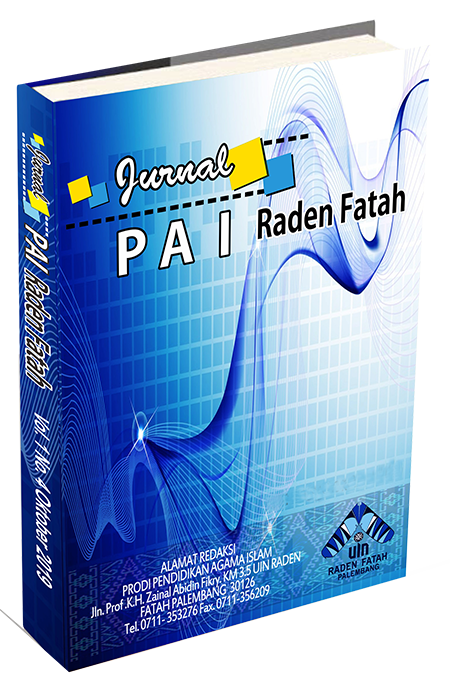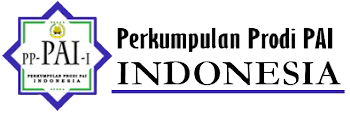Internalisasi Nilai-Nilai Islam Wasathiyah dalam Modul Pengantar Studi Islam Universitas Terbuka: Studi Kasus pada Mahasiswa Pendidikan Agama Islam
DOI:
https://doi.org/10.19109/pair.v7i4.31804Keywords:
Distance Learning, Value Internalization, Strategi IntegrativeAbstract
This study explores the internalization of wasathiyah (Islamic moderation) values within the Introduction to Islamic Studies (PSI) module at Universitas Terbuka and its influence on character development among Islamic Education (PAI) students. Using a qualitative case study design, data were collected from 50 students, three lecturers, and three experts through interviews, observation, and document analysis. The data were analyzed using the Miles and Huberman model, covering data reduction, presentation, and verification. The findings show that wasathiyah values such as ‘adl (justice), tawazun (balance), and tasamuh (tolerance) are integrated thematically within the PSI module. However, their internalization is often limited by descriptive learning methods that lack reflective and dialogic engagement. Lecturers play a crucial role as facilitators in promoting active moral reflection through contextual and case-based approaches. This study highlights the need for a transformative learning design that bridges cognitive knowledge with moral practice, enabling students to embody moderation values in real-life contexts. The novelty of this study lies in identifying pedagogical gaps in distance Islamic education and proposing reflective, value-based strategies to strengthen wasathiyah-oriented character formation among future Muslim educators.
References
Abedini, A., Abedin, B., & Zowghi, D. “Adult Learning in Online Communities of Practice: A Systematic Review.” British Journal of Educational Technology 52, no. 4 (2021): 1663–1694. https://doi.org/https://doi.org/10.1111/bjet.13120.
Abitolkha, A. M., & Muvid, M. B. Islam Sufistik: Membumikan Ajaran Tasawuf Yang Humanis, Spiritualis Dan Etis. CV. Pena Persada, 2020.
Aderibigbe, S. A., Idriz, M., Alzouebi, K., AlOthman, H., Hamdi, W. B., & Companioni, A. A. “Fostering Tolerance and Respect for Diversity through the Fundamentals of Islamic Education.” Religions 14, no. 2 (2023): 212.
Afwadzi, B., & Miski, M. “Religious Moderation in Indonesian Higher Educations: Literature Review.” Ulul Albab: Jurnal Studi Islam 22, no. 2 (2021): 203–31. https://doi.org/https://doi.org/10.18860/ua.v22i2.13446.
Alabdulhadi, M. M. J., & Alkandari, K. M. “Practices of Islamic Education Teachers in Promoting Moderation (Wasatiyyah) Values among High School Students in Kuwait: Challenges and Obstacles.” Cogent Education 11, no. 1 (2024). https://doi.org/https://doi.org/10.1080/2331186X.2024.2365577.
Ashraf, M. A., Yang, M., Zhang, Y., Denden, M., Tlili, A., Liu, J., Huang, R., & Burgos, D. “A Systematic Review of Systematic Reviews on Blended Learning: Trends, Gaps and Future Directions.” Psychology Research and Behavior Management 14 (2021): 1525–1541. https://doi.org/https://doi.org/10.2147/PRBM.S331741.
Azizah, A., Muluk, H., & Milla, M. N. “Pursuing Ideological Passion in Islamic Radical Group’s Insurgency: A Case Study of Negara Islam Indonesia.” Indonesian Journal of Islam and Muslim Societies 13, no. 1 (2023): 1–27. https://doi.org/https://doi.org/10.18326/ijims.v13i1.
Bahno, Y., & Serhiichuk, O. “Pedagogical Practice as the Basis for the Formation of Pedagogical Values of Future Teachers in Higher Education Institutions.” Scientia et Societus 2, no. 2 (2023): 63–72. https://doi.org/https://doi.org/10.69587/ss/2.2023.63.
Bruhn-Zass, E. “Virtual Internationalization as a Concept for Campus-Based and Online and Distance Higher Education. In Q. Tian, D. Burgos, & J. Keengwe.” Handbook of Open, Distance and Digital Education, 2022, 1–18. https://doi.org/https://doi.org/10.1007/978-981-19-0351-9_23-1.
Cahyo, E. D., Hidayat, S., Mahgribi, H., Prasetyo, F. I., & Kurniawati, D. A. “Internalization of Wasaṭiyyah Educational Values in the Guidelines for Islamic Life of Muhammadiyah Citizens at Muhammadiyah University of Surakarta. In M. H. Islamy & A. Latief.” Proceedings of the International Conference on Islam and Education (ICIED 2023), 2024, 239–51. https://doi.org/https://doi.org/10.2991/978-2-38476-102-9_22.
Çalıkoğlu, A., Bulut‐Sahin, B., & Aşık, A. “Virtual Exchange as a Mode of Internationalization at a Distance: Experiences from Türkiye.” British Journal of Educational Technology 56, no. 2 (2025): 909–26. https://doi.org/https://doi.org/10.1111/bjet.13546.
Chotimah, C., Qudsy, S. Z., & Yusuf, M. “Superficial Implementation of Religious Moderation in Islamic Educational Management.” Cogent Education 12, no. 1 (2025). https://doi.org/https://doi.org/10.1080/2331186X.2024.2442235.
Chou, F., Buchanan, M. J., McDonald, M., Westwood, M., & Huang, C. “Narrative Themes of Chinese Canadian Intergenerational Trauma: Offspring Perspectives of Trauma Transmission.” Counselling Psychology Quarterly 36, no. 2 (2023): 321–49. https://doi.org/https://doi.org/10.1080/09515070.2022.2093165.
Cornelio, J. S., Gauthier, F., Martikainen, T., & Woodhead, L. Routledge International Handbook of Religion in Global Society. 1st ed. London and New York: Routledge, 2021.
Eliza, E., Karni, A., Ashadi, A., & Hadi, R. T. “Kalam Science and Its Urgency in the Context of Religious Moderation (Islam Wasathiyah).” International Journal of Islamic Studies and Humanities 7, no. 1 (2024): 1–19. https://doi.org/https://doi.org/10.26555/ijish.v7i1.10121.
Gamage, K. A. A., Dehideniya, D. M. S. C. P. K., & Ekanayake, S. Y. “The Role of Personal Values in Learning Approaches and Student Achievements.” Behavioral Sciences 11, no. 7 (2021): 102. https://doi.org/https://doi.org/10.3390/bs11070102.
Halstead, J. M., & Taylor, M. J. “Learning and Teaching about Values: A Review of Recent Research.” Cambridge Journal of Education 30, no. 2 (2000): 169–202. https://doi.org/https://doi.org/10.1080/03057640050075161.
Hasibuan, H., Amin, I., & Yani, A. “Internalization Values of Religious Moderation Using Theoanthropoecocentric Paradigma at Ma’had Al-Jamiah at IAIN Padangsidimpuan.” Jurnal Iqra’: Kajian Ilmu Pendidikan 7, no. 2 (2022): 142–55. https://doi.org/https://doi.org/10.25217/ji.v7i2.2631.
Hewindati, Y. T., Handayani, S. K., Zuhairi, A., & Gerungan, R. A. “Review of Learning Materials of an Ecology Course at Universitas Terbuka.” Asian Association of Open Universities Journal 18, no. 2 (2023): 132–43. https://doi.org/https://doi.org/10.1108/AAOUJ-08-2022-0109.
Idris, T., Rijal, F., Irwandi, Hanum, R., & Mardhiah, A. “A Multicultural Approach in Islamic Education Learning to Strengthen the Islamic Identity of Moderate Students in PTKIN Aceh.” Tafkir: Interdisciplinary Journal of Islamic Education 5, no. 3 (2024): 478–493. https://doi.org/https://doi.org/10.31538/tijie.v5i3.1138.
Kim, J., Lee, H., & Cho, Y. H. “Learning Design to Support Student-AI Collaboration: Perspectives of Leading Teachers for AI in Education.” Education and Information Technologies 27, no. 5 (2022): 6069–6104. https://doi.org/https://doi.org/10.1007/s10639-021-10831-6.
Kuo, Y.-K., Batool, S., Devi, S., Tahir, T., & Yu, J. “Exploring the Impact of Emotionalized Learning Experiences on the Affective Domain: A Comprehensive Analysis.” Heliyon 10, no. 1 (2024). https://doi.org/https://doi.org/10.1016/j.heliyon.2023.e23263.
Lizardo, O. “Culture, Cognition, and Internalization.” Sociological Forum 36, no. 1 (2021): 1177–1206. https://doi.org/https://doi.org/10.1111/socf.12771.
Maarif, M. A., Muarofah, S. L., Sianipar, G., Hariyadi, A., & Kausar, S. “Implementation of PAI Learning Design in Developing Religious Tolerance in Public High Schools.” Tafkir: Interdisciplinary Journal of Islamic Education 4, no. 4 (2023): 547–558. https://doi.org/https://doi.org/10.31538/tijie.v4i4.712.
Madin, Z., Aizhana, A., Nurgul, S., Alma, Y., Nursultan, S., Al Ayub Ahmed, A., & Mengesha, R. W. “Stimulating the Professional and Personal Self-Development of Future Teachers in the Context of Value-Semantic Orientation.” Education Research International 2022 (2022). https://doi.org/https://doi.org/10.1155/2022/8789773.
Mahmudulhassan, M., Waston, W., Muthoifin, M., & Ahmed Khondoker, S. U. “Understanding the Essence of Islamic Education: Investigating Meaning, Essence, and Knowledge Sources.” Solo Universal Journal of Islamic Education and Multiculturalism 2, no. 1 (2024): 27–36. https://doi.org/https://doi.org/10.61455/sujiem.v2i01.115.
Mendenhall, M., Cha, J., Falk, D., Bergin, C., & Bowden, L. “Teachers as Agents of Change: Positive Discipline for Inclusive Classrooms in Kakuma Refugee Camp.” International Journal of Inclusive Education 25, no. 2 (2021): 147–65. https://doi.org/https://doi.org/10.1080/13603116.2019.1707300.
Metcalfe, J., & Moulin-Stożek, D. “Religious Education Teachers’ Perspectives on Character Education.” British Journal of Religious Education 43, no. 3 (2021): 349–60. https://doi.org/https://doi.org/10.1080/01416200.2020.1713049.
Miles, M. B., Huberman, A. M., & Saldaña, J. Qualitative Data Analysis: A Methods Sourcebook. 3rd ed. Los Angeles: SAGE Publications, 2014.
Mukhibat, M., Effendi, M., Setyawan, W. H., & Sutoyo, M. “Development and Evaluation of Religious Moderation Education Curriculum at Higher Education in Indonesia.” Cogent Education 11, no. 1 (2024). https://doi.org/https://doi.org/10.1080/2331186X.2024.2302308.
Nasution, K., & Rohani, L. Eksistensi Rumah Moderasi Beragama Di PTKIN. PT. Sonpedia Publishing Indonesia, 2023.
Nugroho, P., & Nailufaz, W. U. “Religious Moderation and Local Religious Content Curriculum: A Study of the Internalization of the Religious Moderation Values in Madrasa.” Penamas 35, no. 1 (2022): 131–46. https://doi.org/https://doi.org/10.31330/penamas.v35i1.537.
Purkon, A. “Rethinking of Contemporary Islamic Law Methodology: Critical Study of Muhammad Shahrūr’s Thinking on Islamic Law Sources.” HTS Teologiese Studies 78, no. 1 (2022). https://doi.org/https://doi.org/10.4102/hts.v78i4.7152.
Ridwan, A. H., Rahman, M. T., Budiana, Y., Safrudin, I., & Septiadi, M. A. “Implementing and Interpreting Fazlur Rahman’s Islamic Moderation Concept in the Indonesian Context.” Journal of Islamic Thought and Civilization 12, no. 2 (2022): 58–73. https://doi.org/https://doi.org/10.32350/jitc.122.05.
Saada, N. “Balancing the Communitarian, Civic, and Liberal Aims of Religious Education: Islamic Reflections.” Religions 13, no. 12 (2022): 1198. https://doi.org/https://doi.org/10.3390/rel13121198.
Servant-Miklos, V., & Noordegraaf-Eelens, L. “Toward Social-Transformative Education: An Ontological Critique of Self-Directed Learning.” Critical Studies in Education 62, no. 2 (2021): 147–163. https://doi.org/https://doi.org/10.1080/17508487.2019.1577284.
Smeplass, E. “Nurturing Inclusivity and Professional Growth among Vocational Teachers through Communities of Practice.” Pedagogy, Culture & Society, 2023, 1–20. https://doi.org/https://doi.org/10.1080/14681366.2023.2268108.
Sugiyono. Metodologi Penelitian Kuantitatif, Kualitatif Dan R & D, 2020.
Suwanda, D., Suryana, D., Suherman, U., Nadhirah, N. A., Dahlan, T. H., & Ahmad, A. B. “Effect of Tacit Knowledge on Student Self-Determination in Indonesia: A Mixed-Methods Study.” Education Research International, 2023, 2023. https://doi.org/https://doi.org/10.1155/2023/6122547.
Syafi’i, I., & Rofi’i, F. “Mengkonstruk Toleransi Melalui Pendidikan Wasathiya Di Yayasan Masjid Al Falah Surabaya.” Sumbula: Jurnal Studi Keagamaan, Sosial Dan Budaya 8, no. 2 (2023): 307–30. https://doi.org/https://doi.org/10.32492/sumbula.v8i2.5600.
Syafi’i, I. Islam Wasathiya Dan Model Komunikasi Majelis Ta’lim Surabaya. Surabaya: Inoffast Publishing, 2023.
Syafii, I. “Innovation of Islamic Wasathiyah Education Methods: Transformation of Da’wah in the Contemporary Era.” Indonesian Research Journal in Education 9, no. 2 (2025): 963–76. https://doi.org/https://doi.org/10.22437/irje.v9i02.42992.
Tobón, S., Juárez-Hernández, L. G., Herrera-Meza, S. R., & Núñez, C. “Pedagogical Practices: Design and Validation of SOCME-10 Rubric in Teachers Who Have Recently Entered Basic Education.” Psicología Educativa 27, no. 2 (2021): 155–65. https://doi.org/https://doi.org/10.5093/psed2021a13.
Wani, H., Abdullah, R., & Chang, L. “An Islamic Perspective in Managing Religious Diversity.” Religions 6, no. 2 (2025): 642–656. https://doi.org/https://doi.org/10.3390/rel6020642.
Yasin, A. F., Chakim, A., Susilawati, S., & Muhammad, S. H. “Development of Islamic Religious Education Learning in Forming Moderate Muslims.” Tafkir: Interdisciplinary Journal of Islamic Education 4, no. 1 (2023): 22–36. https://doi.org/https://doi.org/10.31538/tijie.v4i1.227.
Yu, H. “The Application and Challenges of ChatGPT in Educational Transformation: New Demands for Teachers’ Roles.” Heliyon 10, no. 2 (2024). https://doi.org/https://doi.org/10.1016/j.heliyon.2024.e24289.
Zuhri, A. M. “Islam Moderat: Konsep Dan Aktualisasinya Dalam Dinamika Gerakan Islam Di Indonesia.” The Journal of Social Psychology 159, no. 6 (2022): 766–79.












.png)


1.png)



